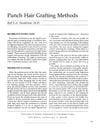 1 citations,
May 2017 in “InTech eBooks”
1 citations,
May 2017 in “InTech eBooks” The document concludes that alopecia areata is an unpredictable autoimmune hair loss condition with no cure, but various treatments exist that require personalized approaches.
 1 citations,
July 2016 in “Elsevier eBooks”
1 citations,
July 2016 in “Elsevier eBooks” Understanding skin structure and development helps diagnose and treat skin disorders.
 1 citations,
January 2014 in “Elsevier eBooks”
1 citations,
January 2014 in “Elsevier eBooks” Melanocytes produce melanin; their defects cause vitiligo and hair graying, with treatments available for vitiligo.
 1 citations,
January 1985 in “Facial Plastic Surgery”
1 citations,
January 1985 in “Facial Plastic Surgery” The document recommends careful planning and techniques for successful punch hair grafting in hair restoration.
 January 2025 in “Cellular and Molecular Life Sciences”
January 2025 in “Cellular and Molecular Life Sciences” BMP4 helps stem cells turn into pigment-producing cells, affecting hair color and growth.
 November 2024 in “Medicina”
November 2024 in “Medicina” Recognizing scalp symptoms in PRP is crucial for proper diagnosis and treatment.
 October 2024 in “Aesthetic Plastic Surgery”
October 2024 in “Aesthetic Plastic Surgery” Micrografts are a safe and effective treatment for hair loss in both men and women.
 July 2024 in “Journal of Dermatology Research Reviews & Reports”
July 2024 in “Journal of Dermatology Research Reviews & Reports” Stem cell therapy shows promise for treating hair loss by promoting hair growth.
 May 2024 in “Journal of functional foods”
May 2024 in “Journal of functional foods” Coffee bean residue extract helps hair growth by activating cell processes.
 May 2024 in “bioRxiv (Cold Spring Harbor Laboratory)”
May 2024 in “bioRxiv (Cold Spring Harbor Laboratory)” KAP-depleted hair causes less immune response and is more biocompatible for implants.
April 2024 in “Biomolecules” Exosomal miRNAs from stem cells can help improve skin health and delay aging.
 March 2024 in “Bioactive Materials”
March 2024 in “Bioactive Materials” New treatment using engineered nanovesicles in hydrogel improves hair growth by repairing hair follicle cells in a mouse model of hair loss.
 February 2024 in “Journal of Dermatological Science”
February 2024 in “Journal of Dermatological Science” Curved hair can develop when hair cells merge abnormally during growth.
Hair proteins in preschool children and their mothers could indicate developmental changes and health status.
 November 2023 in “Journal of cosmetic dermatology”
November 2023 in “Journal of cosmetic dermatology” Fat transplants using a patient's own fat can rejuvenate and repair tissues effectively.
 November 2023 in “Stem cells and cloning”
November 2023 in “Stem cells and cloning” A new treatment using stem cell-conditioned media significantly improved hair growth in people with temporary hair loss.
 October 2023 in “Scientific Reports”
October 2023 in “Scientific Reports” Oxytocin may help hair grow by increasing hair growth-related genes and factors.
 September 2023 in “Journal of microbiology and biotechnology”
September 2023 in “Journal of microbiology and biotechnology” A type of collagen helps hair grow by boosting cell growth and activating a specific hair growth pathway.
 September 2023 in “International Journal of Trichology”
September 2023 in “International Journal of Trichology” Adipose-derived stem cells may help with hair loss, but more research is needed.
 July 2023 in “Regenerative Therapy”
July 2023 in “Regenerative Therapy” Stem cell and platelet-rich plasma therapies show promise for COVID-19 related hair loss, but more research is needed.
 June 2023 in “Antioxidants”
June 2023 in “Antioxidants” Lipids from Schizochytrium sp. help prevent hair loss by protecting hair cells from damage and promoting hair growth.
 January 2023 in “Journal of orthopedics & bone disorders”
January 2023 in “Journal of orthopedics & bone disorders” Platelet-rich plasma may not be very effective for bone healing and hair growth due to a substance it contains that blocks these processes.
 April 2021 in “The journal of investigative dermatology/Journal of investigative dermatology”
April 2021 in “The journal of investigative dermatology/Journal of investigative dermatology” 6.1% of patients seeking PRP for hair loss had undiagnosed cicatricial alopecia, which PRP cannot treat.
 March 2021 in “Indian Journal of Case Reports”
March 2021 in “Indian Journal of Case Reports” A young woman with late-stage Vogt-Koyanagi-Harada disease was successfully treated at a hospital.
 August 2019 in “Stem cells”
August 2019 in “Stem cells” New treatments for hair loss, fertility, and wound healing are being explored.
 January 2019 in “Springer eBooks”
January 2019 in “Springer eBooks” Acne can appear or persist in adulthood due to hormonal changes, external factors, or substance use, and requires appropriate treatment.
 July 2018 in “Elsevier eBooks”
July 2018 in “Elsevier eBooks” New hair loss treatments show promise, but more research is needed to confirm their effectiveness.
 May 2018 in “Journal of Investigative Dermatology”
May 2018 in “Journal of Investigative Dermatology” Fat under the skin can help hair grow longer, darker, and increase cell growth.
 January 2018 in “Springer eBooks”
January 2018 in “Springer eBooks” PDE inhibitors, especially PDE4 inhibitors like apremilast, are effective for certain inflammatory skin conditions but have side effects and can be costly.
 April 2017 in “Journal of Investigative Dermatology”
April 2017 in “Journal of Investigative Dermatology” PRC1 influences skin stem cell development by both turning genes on and off, affecting hair growth and skin cell types.




























